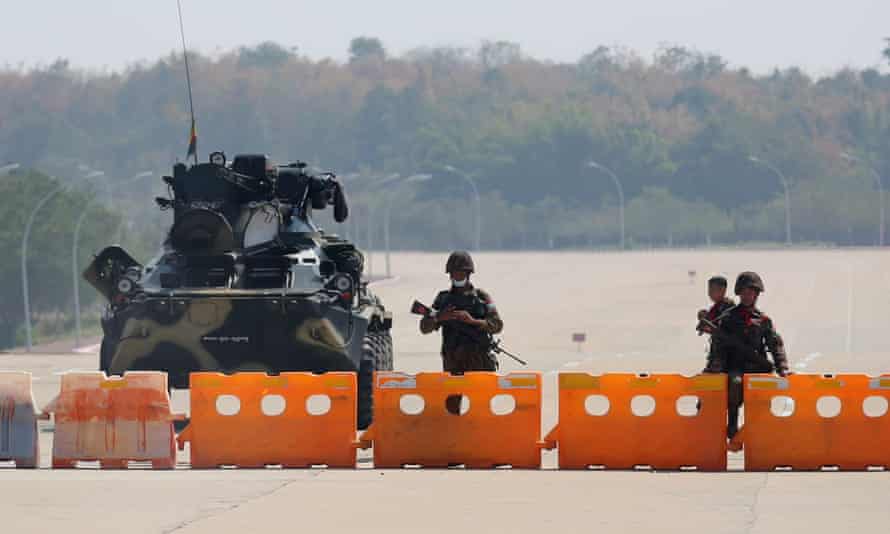Advertisement
Yet the international community, in particular the EU and US, also holds some responsibility for the events that led up to Monday’s coup. In 2013, blinded by the promise of “political progress” and Aung San Suu Kyi’s release from house arrest, it was the EU that rushed to lift decades of debilitating economic sanctions in Myanmar, without securing any significant concessions from the military and no binding assurance the 2008 constitution would be rewritten.
The US then followed suit in 2016, with Barack Obama keen to have a democratic Myanmar at the heart of his “pivot to Asia” policy.
Cries from activists and human rights organisations that it was rushed, “premature and regrettable” went ignored. It was something of a betrayal of Aung San Suu Kyi, who in 2011 had said she would never rule Myanmar under the military’s 2008 constitution.
Left without leverage over the military after the EU lifted sanctions and the US prepared to do the same, Aung San Suu Kyi evidently felt she had no choice but to take power under the 2008 constitution.
The relationship between the military and Aung San Suu Kyi was therefore never smooth, but it was a marriage of necessity. By co-operating with the military, and turning a blind eye to their human rights atrocities, Aung San Suu Kyi could retain the office she had waited decades to hold, with many of those years confined under military house arrest, and remain the strongest hope for Myanmar’s democratic transition, as fragile and lacklustre as it was.
For the military, whose members have reluctantly realised they will never win any elections democratically due to their unpopularity, Aung San Suu Kyi in power meant the lucrative lifting of international sanctions, and the flow of aid and investment into Myanmar, all while their power remained intact. In fact, though they resented the civilian government, it became increasingly clear that the military had successfully engineered Myanmar’s democratic transition to serve their interests.
Their budget rose by up to $100m a year, and their business interests in hotels and mobile phone networks boomed. They continued their military operations against ethnic minorities across Myanmar unencumbered while Aung San Suu Kyi’s pledge to oversee a peace process to end these long-running and brutal conflicts came to nothing.
Indeed, Aung San Suu Kyi’s legacy in the west will forever be that of the Nobel peace prize winner who defended a genocidal campaign against the Rohingya Muslim minority, which, though not carried out on her orders, still happened under her watch.
The military’s designated 25% of parliament seats meant that Aung San Suu Kyi’s government would never have the 75% of votes needed to amend the constitution.
Aung San Suu Kyi and the military’s style of governing has not always proved so different. Under her governance, there was an authoritarian crackdown on freedom of speech and dissent similar to the years under military rule. Human rights deteriorated and the number of political prisoners detained in Myanmar had soared over the past two years.
The army chief, Gen Min Aung Hlaing, who was the initiator of the coup in the early hours of Monday, had always been famously uncooperative with the civilian government but the relationship had reportedly been worsening in recent months.
Aung San Suu Kyi’s controversial defence of the military’s genocidal actions against the Rohingya at the international court of justice in December 2019 had cost her what remained of her international reputation as an icon of peace but earned her little extra favour among the military.
Aung San Suu Kyi had reportedly stopped meeting with the military, particularly after her triumphant re-election in November, where her National League Democracy (NLD) party won 80% of seats and the military had failed to make any parliamentary gains, much to their surprise and anger.
Gen Min Aung Hlaing’s tenure as army chief will also be up in July, when he reaches the mandatory retirement age. The general who oversaw the ethnic cleansing of the Rohingya has shown no desire to step down from power, which has allowed him and his family to amass considerable wealth, but authorisation to extend his leadership has to come from Aung San Suu Kyi.
Some have therefore speculated that the coup was initiated by Gen Min Aung Hlaing more as a means to protect his own personal power and position, rather than because the military had lost patience with not being solely in charge or because of real alleged “concerns” over rigging of November’s election.
Despite her fall from grace in the international community, Aung San Suu Kyi is still widely revered and loved in Myanmar, and her detention marks a return to sadly familiar scenes of over a decade ago.
Yet, unlike in previous coups, when political prisoners were taken away in the dead of night and tortured, this time security services allowed the detained politicians and activists to bring clothes, food and medicines with them. As one Myanmar expert darkly put it “you could almost call it progress”.


Leave A Comment